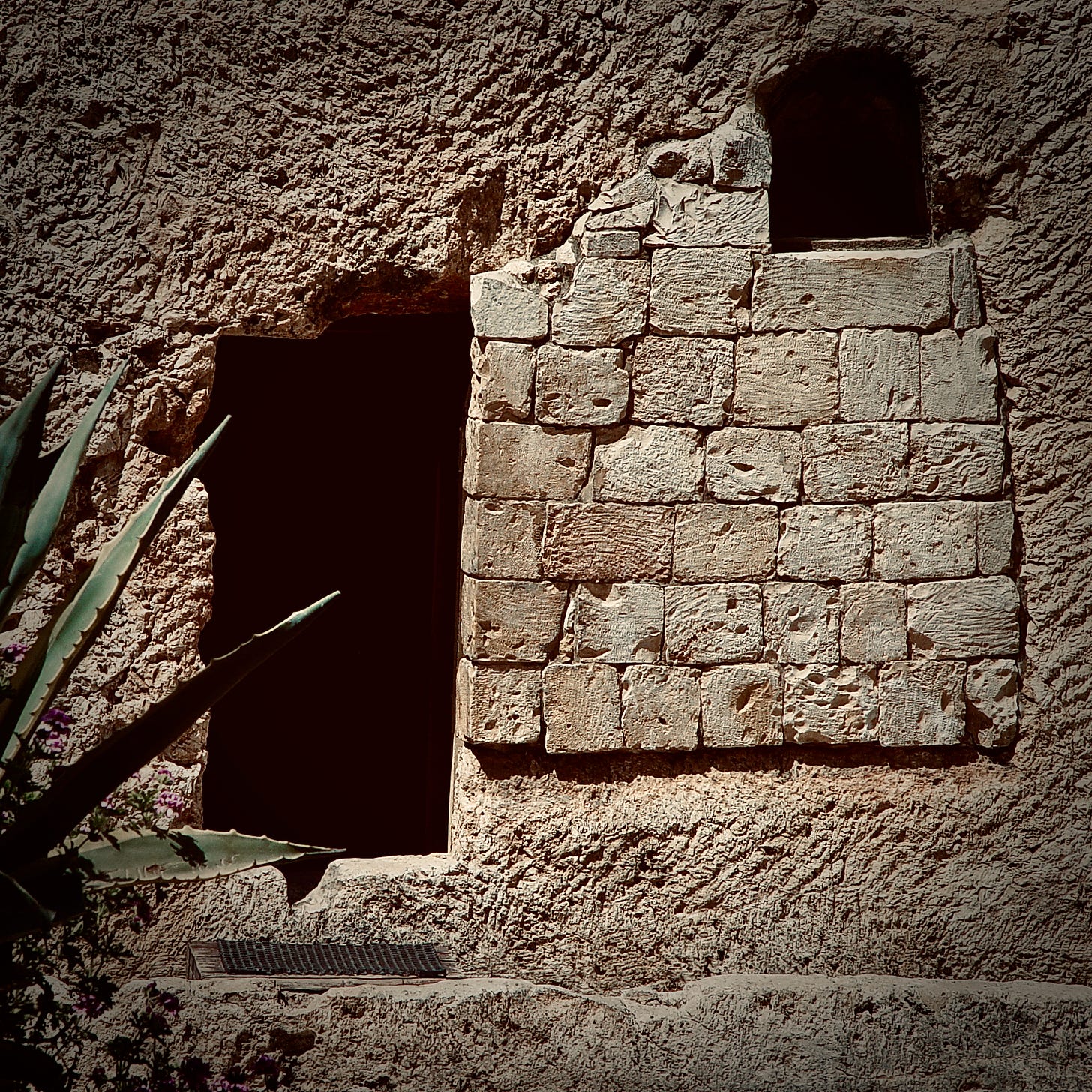It Is Finished!
This is one of the last seven statements Jesus Christ uttered from the cross at Calvary. What does it actually mean? Understanding this phrase is essential to expressing the true Spirit of Christmas.

Readers of this article are invited to receive it as an all-year-round message, if you will. Our view at Veritas Chronicles is that it is Christmas every day; Easter every day; every day is a sabbath celebration. Meantime, for Christians and for much of the world-at-large, Christmas is here, again. People choose to celebrate this season in many ways, but no matter how we choose to celebrate, we have to acknowledge that the birth of the Messiah is the middle of the story, not the beginning.
The story of Jesus Christ predates His mortality. His coming as the Messiah was prophesied for millennia before He came. Preparing a people to receive Him at His coming is the core concept of the entire Old Testament. He was born in a manger, lived perfectly, and fulfilled His earthly mission. That part of the story is the entire context of the New Testament.
And still, His story goes on — forever.
So with forever in mind, what does His statement from the cross, “It is finished,” mean?1 Does it mean, only, that he had endured the torments of Gethsemane and Roman tortures, and that, at last, the pain and suffering was over?
Or, did He mean, in that moment, much, much, more — that he had completed all “the work” required for the salvation of all people for all time? If the latter, then our celebrations should be glad and triumphant in the extreme, and not just reserved for the Christmas season.
It’s wonderful to sing the carols and be cheerful about the coming of the Son of God, born as a baby. The time foretold had arrived, so we pause there, celebrate with Mary and Joseph, with the shepherds, Simeon and Anna in the temple, and later, with the wise men. But then, let’s proceed to the next chapters, because, the baby didn’t do any saving. He had to come, and He did, most miraculously. Then, He had to grow into His mission, increasing in wisdom and stature, and learning the ways of men and God (see Luke 2:40,52).
By far the greatest miracles, and the sole purpose of His mortal sojourn, were connected with the end of His life, not the beginning.
So now we skip through 33 years. He spent some time in Egypt, but mostly grew up in Nazareth, learning to be a carpenter or stone mason, perhaps both. At the age of 30, He announced Himself in a synagogue in Nazareth as the long awaited Messiah. That didn’t go down well with the locals. The next 3 years were a tempest of miracles, believers, doubters, soldiers, schemers, profound teachings, and finally, the Last Supper, Gethsemane, betrayal, trial, scourging, and the cruel crucifixion at Golgotha. His light was extinguished, or so it seemed.
“He was in the world, and the world was made by Him, and the world knew Him not. He came unto His own, and his own received Him not (KJV John 1:10-11).”
Most people who think about the Bible, and the events that surrounded Christ’s arraignment, crucifixion, and death, probably imagine that all was darkness, confusion, and vain hope amongst the disciples in Jerusalem, until the brightness of the resurrection. That mental picture is informed, in large part, by a certain perception of a “forsaken cry” as reported in the gospels.
Thinking of the final scenes of His agony has meant, to many, imagining Jesus crying in abandoned distress to the Father, as written in Matthew 27:46 and Mark 15:36, My God, My God, why hast Thou forsaken Me?
However, the words Jesus spoke (or cried, or sang), My God, My God, why hast Thou forsaken Me, are also the opening phrase of a Messianic psalm of David. The whole of Psalm 222 is a Messianic and Millennial prophecy about the overcoming of sorrows, the redemption of the world, being saved to a new condition where Christ reigns as the governor among the nations (verse 28), concluding with, He hath done this (verse 31).
Was it Jesus’ intent, when He uttered the first words of that psalm, to cry to His Father, a murmur of pained distress? Or something diametrically different, invoking the rest of the psalm, indicating total completion of the salvific campaign? Was He delivering a message of overcoming? Were those words directed more to the mourners, rather than to His Father, and therefore to all His disciples, that He was closing His ministry in the same way He opened it, using prophetic scripture?
He opened His ministry with the Messianic statement, The Spirit of the Lord is upon me, because He hath anointed me to preach the gospel to the poor; He hath sent me to heal the brokenhearted, to preach deliverance to the captives, and recovering of sight to the blind, to set at liberty them that are bruised, to preach the acceptable year of the Lord. Jesus then said, This day is this scripture fulfilled in your ears.3 Why would it be otherwise at the ending than it was in the beginning? Quoting Psalm 22 then, was a sign of His triumph, not His despair or forsakenness.
Referencing Psalm 22 in connection to Christ’s atonement demands a rethink of any assumption about who Jesus was calling to, and what message He was delivering at that point in His infinite ordeal. It also gives us a wonderful launching place from which to explore every aspect of the events, the sayings, the sequencing, and the implications of Jesus Christ’s atoning sacrifice in Gethsemane and at Calvary.
If we assume that Jesus was deliberately citing the psalm — when did He do anything not deliberately — then we also see Jesus lighting a flare, sending a bright and revealing light direct from the cross, telling all with eyes to see and ears to hear; telling them … us … that His suffering was ending, therefore, all suffering will have an end. He was saying, in effect: My God, I’m coming. My people, all is well. I have done it. I have fulfilled the promises. You are saved!
There is an ancient Jewish tradition (still widely in effect today amongst orthodox Jews), when one person at a gathering begins to recite the first verse of a psalm or other passage of scripture, the rest of the psalm or scripture is explicitly implied, and is usually recited to completion, by others present. Jesus was born a Jew, and crucified in Jerusalem. He was surrounded by a handful of faithful followers who were also Jews. When He chanted the opening of Psalm 22 to that devout Jewish audience, He would have been intentionally invoking the rest of the psalm, through to its concluding message, “He hath done this.”4
Why do the writers of the gospels not make this connection between the words from the cross and the psalm? Matthew, in particular, was always careful to point out when prophecy had been fulfilled. How does one account for the fact that all the gospels were written after the resurrection, after Christ’s 40 day ministry with the disciples, decades after the events they describe, so the gospel writers could not have remained quite so mystified by the final episode of Christ’s mortal ministry as they were at the time of the occurrence? Given their up close and personal engagement in Christ’s post-resurrection ministry, why did they report as sparsely as they did, not telling us more, nor explaining more? We cannot know the exact answer to that question. They certainly knew more at the time they wrote. Perhaps they were being circumspect by instruction from the Savior, or as the Spirit prompted them. Nevertheless, all the above leads to the tying of several separate and beautiful scriptures into an awesome sequence —
Matthew 27:46 and Mark 15:36 report Jesus saying with a loud voice, My God, My God, why hast Thou forsaken Me? We propose that He was singing, sighing, chanting, reciting, in a mixture of anguish and joy, the first words of Psalm 22, with the expectation that His followers at the cross, and through all the ages that followed, would complete the recitation of that psalm and share in His joyous song of completion and celebration!
Psalm 22 is a song of David (whether written for or by David doesn’t matter for the present purpose). It is a Messianic and Millennial prophecy extraordinarily rich in its details of what Christ endured during His atoning sacrifice, and also concerning the ultimate saved condition of His people, ending with, He hath done this. We are not aware of any single passage of scripture that has more prophetic detail about Christ’s crucifixion coupled with the saving effects of His atonement than this single chapter of 31 verses. (Isaiah 53 is the only other possible comparison.) Thus, the strategic, intentional, recitation of a mere handful of words, said more about what had just been done and what would therefore transpire for the human family, than any other single reference could achieve.
Jesus’ joy (and His grace, and His mercy) always superseded His suffering. Paul makes a remarkable comment about the power of Jesus Christ’s enduring joy: Jesus ... the author and finisher of our faith; who for the joy that was set before Him endured the cross, despising the shame, and is set down at the right hand of the throne of God (KJV Hebrews 12:2).
That truth is never more evident than in Jesus’ final remarks from the cross. His last comment was addressed to His Father: It is finished, into Thy hands I commend My spirit (KJV Luke 23:45). His penultimate declaration was to declare to the witnesses gathered at the cross, in effect, “I have done My work, salvation is complete, thus, joy to the world!”
And so, we sing with gusto the words of the Christmas carol, It Came Upon the Midnight Clear, words that can and should resound on all days of the year —
For lo! the days are hast’ning on,
By prophets seen of old,
When with the ever-circling years
Shall come the time foretold,
When the new heav’n and earth shall own
The Prince of Peace their King,
And the whole world send back the song
Which now the angels sing.

Why such gladness, even here and now, while we still live in a broken world, enduring its — and our — frailties? Because, when Jesus Christ completed His earthly mission, and then rose from the grave, He had overcome both spiritual and physical death, making us free from sin, able to live above all pains and sorrows, able to endure joyfully, with certainty, about our prospects in this life and the next. Our ultimate destiny (for those who choose it) is profoundly awesome, as taught by Paul —
For as many as are led by the Spirit of God, they are the sons [and daughters] of God. For ye have not received the spirit of bondage again to fear; but ye have received the Spirit of adoption, whereby we cry, Abba, Father. The Spirit itself beareth witness with our spirit, that we are the children of God: And if children, then heirs; heirs of God, and joint-heirs with Christ; if so be that we suffer with Him, that we may be also glorified together. For I reckon that the sufferings of this present time are not worthy to be compared with the glory which shall be revealed in us (KJV Romans 8:14-18).
The apostle Paul also counseled us to, Stand fast therefore in the liberty wherewith Christ hath made us free (KJV Galatians 5:1). For those who do so, there is peace and freedom abounding. For example —
Matt: “Because of my trust in that freedom, I am not concerned about anything this life tries to burden me with. I have complete trust that God will supply all needs, meaning that there are no overwhelming worries about the future, including death or harm to self or loved ones. I enjoy complete peace that God is in total control with ultimate authority. I'll add to that, freedom in Christ means to me, the ability to genuinely understand and accept any "bad" things that might happen as purposeful by God's sovereign plan. I am at peace with life as it happens.”
Star: My first tangible experience with freedom in Christ occurred in my junior year of high school, when trying to decide which college to attend. I had many choices. I was offered a sports scholarship to Brown University. Dartmouth College in my home state was open to me. Any of the Ivy League schools were also available. At the same time, my brother, whom I looked up to greatly, was at a small liberal arts college near Boston, so that was one of my considerations as well. Being a young person who always solicited advice from older and wiser people, I consulted my father, who was and still is in my estimation, one of the wisest and godliest people of my entire experience. I related to him that I was very concerned that I would make the wrong college choice and inadvertently upset the entire trajectory of the rest of my life.
I was excessively thorough in my investigations into each of the institutions, to be sure they were actually offering what I thought I needed. It became like an overly busy menu at a fine dining restaurant with too many delectable entree options.
My father’s response came with sage counsel, “Star, it is impossible to choose wrongly. If your choice does not contradict something explicitly directed in God’s word, you can choose anything good placed before you, and He will make your choice work out for your good. If you find the situation difficult, you will learn and grow from that experience, and you can choose the next step from there, whether that means changing institutions, or changing course within an institution.”
The immense burden lifted from my shoulders — the freedom experienced from knowing I could not make a wrong decision with God at my side — was one of the most beautiful and life transforming learnings of my entire life. In the end, I rejected the Ivy League and with a sense of wonderful freedom in Christ, I chose the small college my brother attended. I have carried my father’s wisdom and Christ’s freedom with me for more than thirty years, and it has helped shape every major life-choice. Freedom in Christ is a palpable, tangible gift, that lives within me daily and allows me to skip, not trudge or strive, delighting in the adventure of life, despite trials.
David: “I once was a theist. I believed there was a God but had not given much thought to what that meant, but as a married adult, trying to figure out what to teach my children, I searched more deeply and eventually found Jesus. Since then, I have enjoyed freedom from anxiety and worry, and from spiritual, social, and emotional bondage. Life has not been free from trauma in these areas because we live in a fallen world. However, I believe those who enjoy freedom in Christ, are more free from self-centeredness. It's all about Jesus, not self, even though, just like Paul, each day is a struggle, which hopefully becomes less and less of a battle for each of us as we grow older and more mature in Christ. It’s like having a just and fair boss in the workplace, but He brings peace to our “working” environment, at a much higher level. With Jesus as our "boss" our servitude to Him brings peace, and trust, and calm.”
Jesus promised: Come unto me, all ye that labour and are heavy laden, and I will give you rest. Take my yoke upon you, and learn of me; for I am meek and lowly in heart: and ye shall find rest unto your souls. For my yoke is easy, and my burden is light (KJV Matthew 11:28-30).
While we mortals give names to all the days, and seasons, and holidays, God makes special mention only of the Sabbath Day. The formal sacraments of various denominations may happen at specific times and places, but worship, faith and gratitude can be constants, day by day: 24/7/52/365. Jesus admonished us to live today, not tomorrow (see Matthew 11:30), so every day of life is today, until He comes again.
Thus, every day can be sacred like the Sabbath; every day should be celebratory, like Christmas; every day is triumphant, like Easter. How can that be? Every day is a holiday. Every day is a holy day. Because, when we’re our newer-self, born again, enjoying the freedom of spirit that Christ offers, every day of the year can begin, continue and end with reflection on the Word, pondering in prayer and gratitude for His gifts to us. Christmas carols might be included as a welcome part of everyday life.
Even as we celebrate the birth, life, crucifixion and resurrection of Jesus Christ, we don’t need to get caught up in denominational differences. Christ makes room for everyone. For example, the relationship between grace, faith, and works which are sometimes subjects of discussion between theologians and philosophers need not bother anyone. They are best understood as complementary rather than contradictory. Grace is the foundation, faith is the response, and works are the evidence. Together, they reflect the holistic nature of salvation — a divine gift that invites human participation. While practices like ordinances or sacraments may not be universally viewed as "musts," they often play a critical role in helping believers grow in faith and live out the reality of their salvation. No matter which pathway has brought us to this place and time, we can all enjoy the liberty in Christ that makes us free and partakers of the heavenly gift of Christ’s finished work.
“Oh come all ye faithful, joyful and triumphant.”
It is finished.
He has done this!
John 19:28-30 (KJV)
28 ¶ After this, Jesus knowing that all things were now accomplished, that the scripture might be fulfilled, saith, I thirst.
29 Now there was set a vessel full of vinegar: and they filled a sponge with vinegar, and put it upon hyssop, and put it to his mouth.
30 When Jesus therefore had received the vinegar, he said, It is finished: and he bowed his head, and gave up the ghost.
Psalms 22:1-31 (KJV)
To the chief Musician upon Aijeleth Shahar, A Psalm of David.
1 My God, my God, why hast thou forsaken me? why art thou so far from helping me, and from the words of my roaring?
2 O my God, I cry in the daytime, but thou hearest not; and in the night season, and am not silent.
3 But thou art holy, O thou that inhabitest the praises of Israel.
4 Our fathers trusted in thee: they trusted, and thou didst deliver them.
5 They cried unto thee, and were delivered: they trusted inthee, and were not confounded.
6 But I am a worm, and no man; a reproach of men, and despised of the people.
7 All they that see me laugh me to scorn: they shoot out the lip, they shake the head, saying,
8 He trusted on the Lord that he would deliver him: let him deliver him, seeing he delighted in him.
9 But thou art he that took me out of the womb: thou didst make me hope when I was upon my mother’s breasts.
10 I was cast upon thee from the womb: thou art my God from my mother’s belly.
11 Be not far from me; for trouble is near; for there is none to help.
12 Many bulls have compassed me: strong bulls of Bashan have beset me round.
13 They gaped upon me with their mouths, as a ravening and a roaring lion.
14 I am poured out like water, and all my bones are out of joint: my heart is like wax; it is melted in the midst of my bowels.
15 My strength is dried up like a potsherd; and my tongue cleaveth to my jaws; and thou hast brought me into the dust of death.
16 For dogs have compassed me: the assembly of the wicked have inclosed me: they pierced my hands and my feet.
17 I may tell all my bones: they look and stare upon me.
18 They part my garments among them, and cast lots upon my vesture.
19 But be not thou far from me, O Lord: O my strength, haste thee to help me.
20 Deliver my soul from the sword; my darling from the power of the dog.
21 Save me from the lion’s mouth: for thou hast heard me from the horns of the unicorns.
22 I will declare thy name unto my brethren: in the midst of the congregation will I praise thee.
23 Ye that fear the Lord, praise him; all ye the seed of Jacob, glorify him; and fear him, all ye the seed of Israel.
24 For he hath not despised nor abhorred the affliction of the afflicted; neither hath he hid his face from him; but when he cried unto him, he heard.
25 My praise shall be of thee in the great congregation: I will pay my vows before them that fear him.
26 The meek shall eat and be satisfied: they shall praise the Lord that seek him: your heart shall live for ever.
27 All the ends of the world shall remember and turn unto the Lord: and all the kindreds of the nations shall worship before thee.
28 For the kingdom is the Lord’s: and he is the governor among the nations.
29 All they that be fat upon earth shall eat and worship: all they that go down to the dust shall bow before him: and none can keep alive his own soul.
30 A seed shall serve him; it shall be accounted to the Lord for a generation.
31 They shall come, and shall declare his righteousness unto a people that shall be born, that he hath done this.
Jesus Christ announces His divinity in the synagogue at Nazareth (KJV Luke 4:16-21) —
16 ¶ And he came to Nazareth, where he had been brought up: and, as his custom was, he went into the synagogue on the sabbath day, and stood up for to read.
17 And there was delivered unto him the book of the prophet Esaias. And when he had opened the book, he found the place where it was written,
18 The Spirit of the Lord is upon me, because he hath anointed me to preach the gospel to the poor; he hath sent me to heal the brokenhearted, to preach deliverance to the captives, and recovering of sight to the blind, to set at liberty them that are bruised,
19 To preach the acceptable year of the Lord.
20 And he closed the book, and he gave it again to the minister, and sat down. And the eyes of all them that were in the synagogue were fastened on him.
21 And he began to say unto them, This day is this scripture fulfilled in your ears.
Although Jesus said its first verse alone in his duress, it is well established that the first word or words of a Jewish text are understood as indicating its entirety, so thereby He regards the whole psalm as foreshadowing His passion and resurrection. See for examples: Albright, W. F. “A Catalogue of Early Hebrew Lyric Poems (Psalm LXVIII),” HUCA 23 (1950-51) 1-39; Menn 2000, p. 331.










